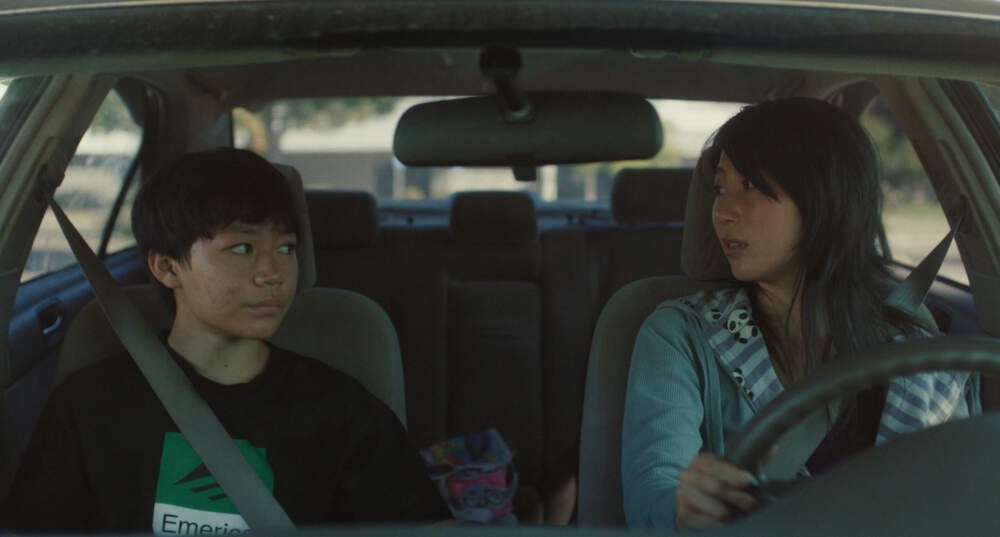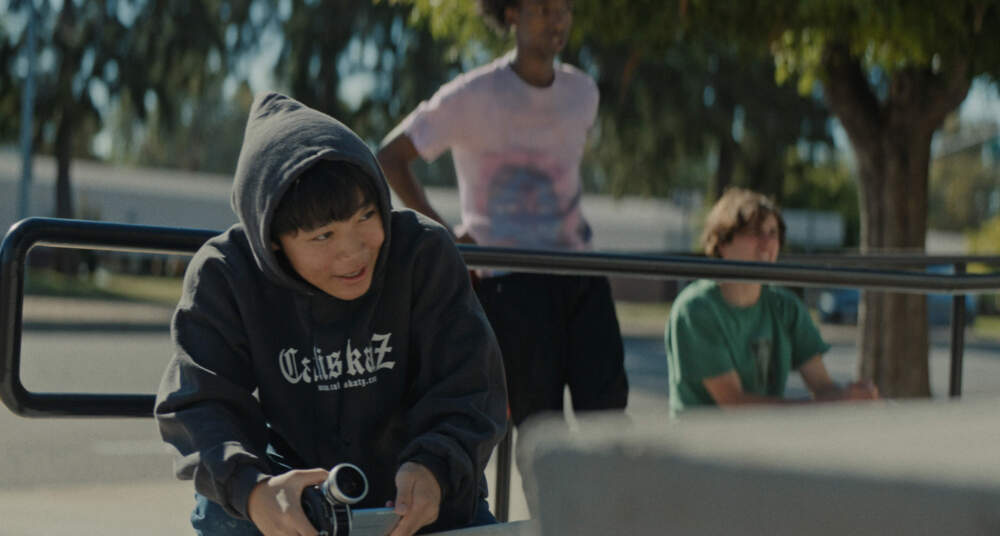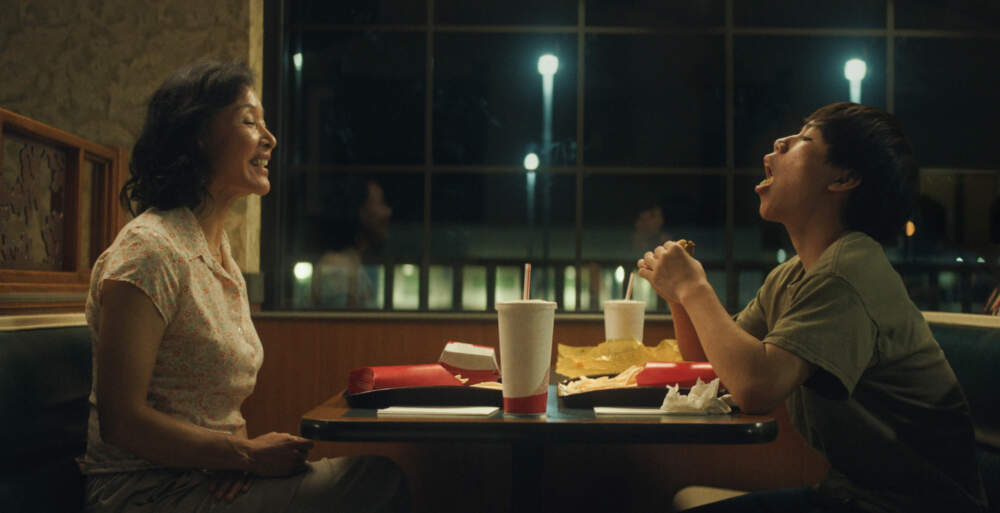Advertisement
Review
Sean Wang's 'Dìdi' is a wise and funny coming-of-age film

The thing about being a teenage boy is that it’s terrible. You’re all hopped up on hormones and aggression while your face and body are doing gross things and you’re terrified and horny all the time. You’re also dumb and destructive for reasons you can’t really understand. It’s a mercifully brief period of life spent acting almost entirely against one’s better judgment, and writer-director Sean Wang’s funny, heartfelt and all-too-true Sundance prizewinner “Dìdi” understands this better than most. It’s a wise coming-of-age film — maybe the best of its kind since “Lady Bird” — about a 13-year-old boy during the seemingly endless summer before high school begins.
Izaac Wang (no relation to the filmmaker) stars as Chris. His family calls him Dìdi but his friends call him Wang-Wang. At least they used to, but that nickname has started feeling a bit too young for him. The movie follows Chris as he tries on new names and different friend groups, trying to figure out who he’s going to be in high school. His sister Vivian (Shirley Chen) is off to college in the fall. The two fight the way only teen siblings can: constantly, viciously and with great love. Vivian calls him “pizza face” because of his acne. Chris makes fun of her “lizard skin eczema.” (It’s nice to see a movie about teenagers in which they’re allowed to look like actual teenagers.) Dad is off working in Taiwan, leaving their mother — played by the great Joan Chen — to be the lonely referee, while also caring for an elderly mother-in-law (Zhang Li Hua) who never really approved of her in the first place.

The film is set in 2008 in the predominantly Asian American, Bay Area suburb of Fremont, but the experiences chronicled herein are universal. I was the main character’s age 20 years before the film takes place, but “Dìdi” still made me cringe with recognition more than once. (The movie begins with him and his buddies blowing up a mailbox, something me and my dumbbell friends also did back then, though I note these kids were smart enough to pick one in front of an old lady’s house instead of destroying federal property like us idiots.) The boys are seen watching the misfit teen comedy classic “Superbad,” and it’s obviously aspirational for them. The funniest scenes in “Dìdi” involve their blustering, R-rated banter — the kind of sex talk that can only come from boys who have never been close to having it.
Chris is crushing hard on Mahaela Park’s Madi, who is a grade ahead of him and thereby several orders of magnitude more mature. The mini-generational divide is such that she’s moved onto Facebook while Chris still uses MySpace. “Dìdi” is a very savvy movie about growing up online, and will cause Proustian reveries in some viewers with its pointed use of AIM instant messaging sound effects and the emotional devastation of discovering you’re no longer displayed in someone’s MySpace “Top 8” friends. (We’ve all been there, Chris.) The best bit finds our young wannabe suitor perusing Madi’s Facebook list of favorite films, pretending that he, too, loves “A Walk to Remember” so they’ll have something to talk about.

Madi is worldly enough to intimidate Chris, and when young boys get frightened they get stupid and mean. The movie is obviously semi-autobiographical, so credit Wang for allowing his cinematic alter ego to act like an awful little jerk sometimes. Chris falls in with a sketchy group of older skater boys, offering to chronicle their amusingly lame stunts as a videographer, or as the kids call it, “a filmer.” (It’s a trip down memory lane to watch them surf through the early era of crude, non-monetized YouTube videos.) Here's where one expects the young filmmaker stand-in to find his calling behind the camera, like the boy genius in Steven Spielberg’s insufferable roman-à-clef “The Fabelmans.” Instead, Chris sort of stinks at it, which is refreshing.
Alas, cinematographer Sam Davis doesn’t fare much better, as “Dìdi” is one of the sludgiest-looking movies I’ve seen in some time. It’s shot in a low contrast digital smear, with some scenes so underlit you’re straining your eyes to see the performers’ reactions. The movie falters after Madi exits, with the protagonist’s slide into mild juvenile delinquency feeling both preordained and familiar. This back stretch is saved by a luminous Joan Chen performance, playing a frustrated artist trying to make the best of a life that didn’t work out the way she’d hoped. Maybe the most important lesson learned by Chris is the realization that his mother had her own life and dreams before he came along, something that throws us all for a loop at that age. The film shrewdly uses the actress’ regal bearing to show how out of place she is in the suburbs. I never thought I’d see the elegant star of “The Last Emperor” and “Twin Peaks” ripping farts in a car.

Some of the most provocative material comes from Chris and his friends’ conflicted attitudes with regard to their racial backgrounds. The skater boys all call him “Asian Chris,” but he lies and insists he’s only half Asian. (Another heartbreak for his mother when she discovers the ruse.) The mixed-race Madi tells him he’s “cute for an Asian,” and without dominating the narrative, ethnicity becomes another component of the different identities these kids are trying out on their way to adulthood.
The best moments in “Dìdi” feel lived-in and true, confronting the confusing hellscape of adolescence with generosity and warmth. Wang has a gift for throwaway details, whether in depicting the hushed aftermath of a family fight in which everyone said things they immediately wish they hadn’t, or the sublimely comic sight of Chris fumbling to hide his erection in front of two older girls. It’s a movie about a very specific time and place, but we’ve all been there.
“Dìdi” opens on Thursday, Aug. 1 at the Coolidge Corner Theatre, Kendall Square Cinema and AMC Boston Common. Writer-director Sean Wang will be in attendance for the evening shows at the Coolidge on Thursday, Aug. 1.
